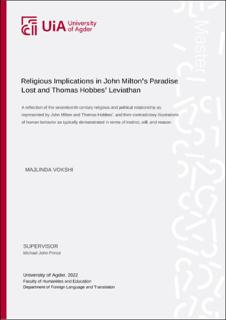Religious Implications in John Milton's Paradise Lost and Thomas Hobbes' Leviathan
Master thesis
Permanent lenke
https://hdl.handle.net/11250/3021528Utgivelsesdato
2022Metadata
Vis full innførselSamlinger
Sammendrag
This thesis aims to demonstrate the opposing religious and political standards in John Milton’sParadise Lost (1667) and in Thomas Hobbes’ Leviathan (1651). A comparison of the tworespective authors illustrates seventeenth-century responsiveness to the implicit religious andpolitical ideas of English authority at that time. This process unfolds itself through aninvestigation of Milton and Hobbes’ opinions on human freedom, and how it should beorganized to maintain peace.Following the English revolution, Milton and Hobbes witnessed a longing for a socialorder. Milton expressed his solution to the problem as complete individual, freedom withoutexternal interference from the state. Hobbes, on the contrary, believed that a concentration ofpower in an absolutist sovereign is what will accommodate social welfare.Further, an analysis of Milton’s epic poem, with its genesis of the first disobedience,presents the deeply instinctual differences between Milton and Hobbes’ fundamental beliefsabout the natural human condition. A thorough examination of Milton’s religious ideology isrevealed through the poem’s characters Adam and Eve, and deals with the freedom of choicethat led them to Fall in the Garden of Eden. This perspective allows me to introduce the fallingnature of mankind that is established through Hobbes political doctrine in Leviathan. Afterreviewing the relationship between the two seventeenth century philosophers, I was able toformulate a conclusion based on the method that has the most promise for a safe performanceof human freedom, and of religion as politics.
